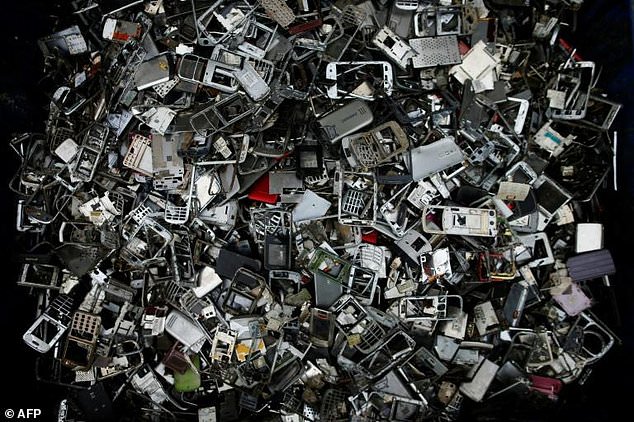World Economic Forum, Geneva
Geneva, Thursday 18 March 2021 – Today, top electronics companies, together with a group of pioneering global organizations, set a vision and roadmap committing to a circular economy for electronics by 2030. These companies include some of the world’s largest consumer brands and represent nearly $6 trillion total market cap.

The global Circular Electronics Partnership (CEP) marks the first time experts, business leaders and global organizations will co-design solutions around this topic. This pre-competitive industry platform will establish a network of networks to elevate the action and ambition of the industry in a coordinated way.
E-waste is currently the fastest-growing waste stream in the world, one estimated at nearly 50 million tons. Research finds that only 17.4% of e-waste is collected and recycled. This waste is worth at least $57 billion annually, more than the GDPs of many countries, offering a unique opportunity for economic growth and resilience if handled correctly.
Extensive stakeholder collaboration is required to maximize this opportunity – and simultaneously create the systems-wide changes needed for true impact and sustainability.
CEP’s vision will maximize the value of components, products and materials through their full lifecycles using safe and fair labor and depending on only circular resources. These shifts will generate economic value while creating social and environmental impact.
This multi-stakeholder partnership will translate commitments into immediate actions, such as:
- Defining circular electronic product and services
- Mobilizing a global, sustainable and circular procurement commitment
- Developing a responsible recycling and circular material data system
- Piloting two material track and trace projects
- Commercial financing mechanisms for increased collection
Along with the partnership, the group announces the launch of an action road map. This document, endorsed by business leaders and experts, identifies six pathways to circularity. The roadmap, released today, focuses on different stages of the value chain to help businesses and partner organizations overcome barriers to circularity.
“There’s no time to waste in finding sustainable solutions for consumption and production,” says Dominic Waughray, Managing Director, World Economic Forum. “The roadmap and vision set forth by the Circular Electronics Partnership will create the necessary momentum to maximize resources, transform value chains and make the circular transition in electronics a reality.”
Collaborators within the electronics industry include Cisco, Close the Loop, Dell Technologies, Glencore, Google, KPMG International, Lanxess, Microsoft, Security Matters, Sims Limited and Vodafone.
The companies have been brought together by a new alliance of convening organizations that include: Global Electronics Council (GEC), Global Enabling Sustainability Initiative (GeSI), Platform for Accelerating the Circular Economy (PACE), Responsible Business Alliance (RBA), World Business Council for Sustainable Development (WBCSD), and the World Economic Forum (WEF).
The vision and roadmap were developed in collaboration with other stakeholders, including the International Telecommunication Union (ITU).
As electronics are omnipresent, a new approach is critical, says Peter Bakker, President and CEO, World Business Council and Sustainable Development. “Far beyond just computers, monitors and phones, electronics are commonly found in everything from clothing to toys.
As applications scale, they should be circular in design, production, use and recovery to create a nature, climate and people positive value chain.
The Circular Electronics Partnership embodies this ambition, he adds, and can serve as the center of gravity for this transition. “WBCSD is proud to host the CEP and we look forward to implementing the Roadmap with our Partners and the biggest companies in electronics.”
Industry partners look forward to working together to find solutions.
“Since creating our first OptiPlex desktop with recycled plastic in 2007 we have been on a mission to drive innovative approaches to accelerate the circular economy. It’s why we set an ambitious goal to get to 50% recycled or renewable materials across our entire product portfolio by 2030,” said Michael Murphy, Vice President, Product Development Engineering at Dell Technologies.
“But as an industry, we need to move faster. Which is why the Circular Electronics Partnership is so important – to drive collaboration and eliminate roadblocks to make bigger strides in circularity.”
###
Coverage highlights
Agence France Presse, Big Tech backs plan to tackle e-waste crisis, click here
COSMOS Magazine, Australia, Can a circular economy eliminate e-waste?
Environmental Leader, United States, Dell, Google, Others Join New Electronics Partnership to Develop Circular Economy
LifeGate, Italy Le big dell’elettronica stringono la loro prima alleanza per l’economia circolare
TyN Magazine, Argentina, Principales marcas de electrónica lanzan la primera alianza del sector privado para la electrónica circular (Leading Electronics Brands Launch First Private Sector Alliance for Circular Electronics)
华强北电脑网 (Huaqiangbei Computer Network), Mainland China, Big Tech支持解决电子垃圾危机的计划 (Big Tech supports the plan to solve the e-waste crisis)
45 Seconds, France, Dell, Microsoft, Google et d’autres entreprises technologiques se joignent à une initiative pour s’attaquer aux problèmes des déchets électroniques (Dell, Microsoft, Google, and other tech companies join initiative to tackle e-waste issues)
Full coverage highlights, click here
News release in full, click here